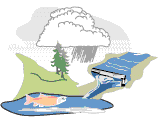OTHER INFO
Climate Links
Climate
Impacts Group
CIG
Seminars
Climate Impacts on the Pacific Northwest
Winter Quarter 2002
SMA 550C / ENVIR 500B / ATMS 591B / GPHYS 580B
Amy Snover & Nathan Mantua
NEWS & INFORMATION
|
March 11, 2002 |
- The White Paper topics and presentations are posted here.
- The paper mentioned in class on Friday, that discussed different methods
of vulnerability mapping and paradigms for sustainable development,
was Schellnhuber, H. J. (1999). 'Earth system' analysis and the second
Copernican revolution. Nature 402(Supp.): C19-C23. Download a
copy here.
|
February 27-28, 2002 |
- Kaje diagram from Wednesday now posted.
- Final essay due Friday.
- No new reading for Friday. (The previously assigned readings -- interesting
and fairly light essays on the issue of salmon recovery in the Columbia
Basin -- have been made optional.)
- White paper presentations start next week! See the course
schedule for your date.
|
February 22, 2002 |
- Doug Canning's lecture notes on coasts have been posted.
- New reading for Wednesday (Feb 27) is the final chapter from CIG's
Rhythms of Change. It was handed out in class today.
|
February 21, 2002 |
- The Kaje diagram on the coasts has been posted.
- The reading for Friday (Feb 22) (the PNCERS report, "Guide to Estuary
Management in the PNCERS Study Area") has been updated. Your reading
packet contains the draft report; the final version has now been published
and is available on the PNCERS web site as a series of .pdf files. To
access the files, go to http://www.wsg.washington.edu/pncers/news.htm
and scroll down to the "Guide to Estuary Management in the PNCERS Study
Area" section. Each chapter of the report has its own hot link.
- New reading for Wednesday (Feb 27) is the final chapter from CIG's
Rhythms of Change. It will be handed out in class tomorrow.
|
February 15, 2002 |
- The Kaje diagram on forest resources has been posted.
- In case you missed it - here's the link to the PI article we've been
talking about this week, "Changing
wildlife patterns linked to global warming."
- The American Association of State Climatologists (AASC) recently released a Policy Statement on Climate Variability and Change. It's a good example of putting a scientific issue (climate prediction) in its social context. The statement's acknowledgment of the human influence on climate is remarkable given the AASC's membership (Pat Michaels, George Taylor, and Bob Balling are all state climatologists) and previous statements (as recently as a few years ago something like 65% of state climatologists denied that humans were changing the climate).
|
February 8, 2002 |
- Alan's lecture notes can be found here,
as well as his original
talk that includes a little more background material.
- Nate's giving the Atmospheric Sciences Colloquium today on Regime
Shifts in Climate and Marine Ecosystems, 3:30 Johnson 64. A powerpoint
version of his talk can be found here.
- Link to the Climate Impacts Group's seminar page.
|
January 30, 2002 |
- An example white paper can be found here.
- Summer fellowship opportunity at Resources for the Future.
|
January 25, 2002 |
- Nate's lecture notes have been posted.
- Link to the Fisheries seminar
series on sustainable fisheries.
- Ze'ev and Kim's Kaje diagram has been posted.
|
January 22, 2002 |
- NEW COURSE
MEETING TIME: The Wednesday course meeting time will be 8:30-9:20
in OTB 211. (Friday's meeting time is unchanged - 9:30-11:20 in OTB
211.)
- Essay questions will be posted
weekly (next essay due Friday, Jan 25).
- The schedules for student-led discussions and white paper
presentations have been posted.
- Check out the Kaje Diagrams page for
information on using & producing Kaje diagrams, as well as the workbook
of the diagrams created in class so far.
- Ed Sarachik's lecture (Jan 18)
- lecture notes have been posted.
- his recommended readings:
- Rogers, E. M. 1995. Diffusion of Innovations. New York: The Free Press.
- Baron, J. 2000. Thinking and Deciding. Cambridge: Cambridge University Press.
- National Research Council. 1999. Making Climate Forecasts Matter. Washington DC: National Academy Press. Also available online.
- International Research Institute for Climate Prediction.
- USAID - Famine Early Warning System network (FEWS)
